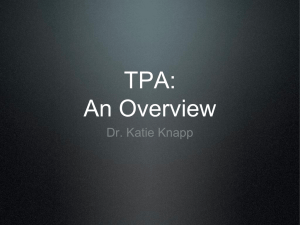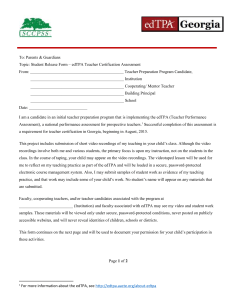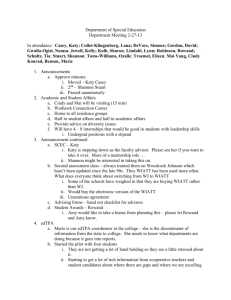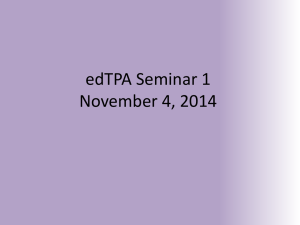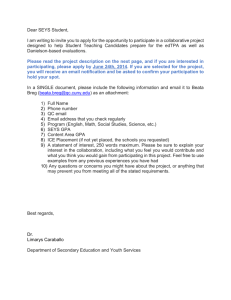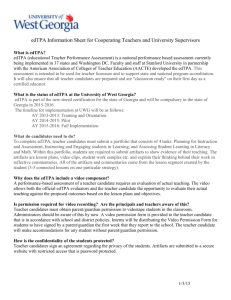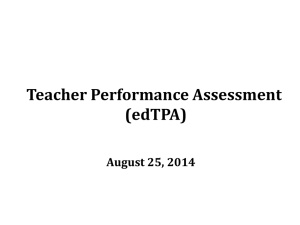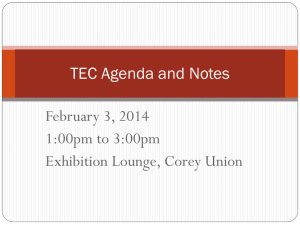the NYSED Guidance on Exams
advertisement
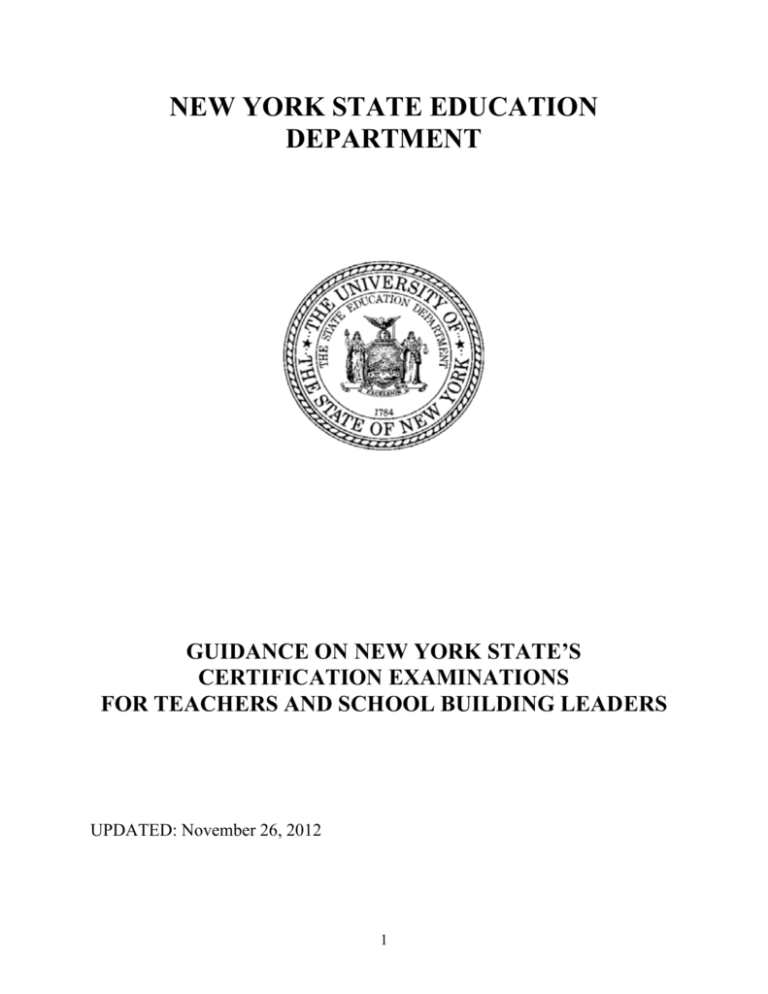
NEW YORK STATE EDUCATION DEPARTMENT GUIDANCE ON NEW YORK STATE’S CERTIFICATION EXAMINATIONS FOR TEACHERS AND SCHOOL BUILDING LEADERS UPDATED: November 26, 2012 1 This document contains questions posed by the New York State higher education community regarding the new certification examinations for those seeking to become teachers and/or school building leaders. Frequently Requested Websites Please review the following websites for further information: 1. New York State Teacher Certification Examinations (NYSTCE) a. Homepage http://www.nystce.nesinc.com/ b. Updates on the New Certification Examinations http://www.nystce.nesinc.com/NY_annProgramUpdate.asp c. edTPA in New York State http://www.nystce.nesinc.com/NY_annTPA.asp 2. New York State Education Department Certification Website http://www.highered.nysed.gov/tcert/ 3. TPAC Online http://tpaconline.ning.com/ 4. edTPA http://edtpa.aacte.org/ 5. New York State Education Department Office of Higher Education- New Certification Exams http://www.highered.nysed.gov/certexam.html All questions about certification exam policies, guidelines, and implementation should be submitted to edcertpolicy@mail.nysed.gov where they will be compiled for inclusion in future guidance documents. 2 Guidance Contents A. General Questions…………………………………………………………..… 4 B. Certification Exam Requirements and Timeline……..…………………..… 4 C. Questions About the NYSTCE …………………………………….…….…. 10 D. General edTPA Questions..……………………………………………..…... 11 E. Costs……………………………………………………………………….…. 14 F. Scoring……………………………………………………………….……….. 15 G. Preparation and Rollout……………………………………………………. 16 H. Program/School of Education Topics……………………………………… 17 I. Video/Permissions……………………………………………………...…….. 18 J. Technology/Platforms……………………………………………….………. 19 K. edTPA Uses………………………………………………………..………… 20 3 A. General Questions A1. What can we do to ensure that P-12 schools are continuing to partner with us in the placement of our candidates? Workforce trends are affecting placements. Over 7,000 teachers were laid off last year and 20,000 teaching positions have been lost over the last three years (almost 10%). In addition, certain positions have very high supply and low demand, which also affects placements while others have high demand, and these positions are more readily accessible for placement. Please keep in mind that points can also be awarded under the 60 points “other measures” portion of the Annual Professional Performance Review to teachers who effectively coach and mentor student teachers or new colleagues (APPR Guidance Document H11). We encourage districts, BOCES and colleges of education to engage in ongoing dialogue regarding the development of realistic placement requests that are aligned with both district capacity and local teacher supply and demand forecasts. A2. How will the P-12 community be notified and informed about the new certification examinations? NYSED developed and is implementing a communication plan and outreach strategy that informs the P-12 community about this work. This plan includes written correspondence, presentations and outreach to key stakeholders. B. Certification Exam Requirements and Timeline B1. If a teacher candidate is graduating after May 1, 2014, which set of certification exams should he/she take for initial certification? Most teacher candidates who apply for initial certification on or after May 1, 2014 or candidates who applied for certification on or before April 30, 2014 but did not meet all the requirements for an initial certificate on or before April 30, 2014, will be required to pass the Teacher Performance Assessment (edTPA), Educating All Students test (EAS), Academic Literacy Skills Test (ALST), and Content Specialty Test (CST). Please see our website (http://www.highered.nysed.gov/tcert/certificate/certexamsl2012.html) for specific details on certification exam requirements. B2. If a teacher candidate will be graduating in May 2014, and has already taken and passed some of the old exams (i.e. the LAST or ATS-W), will he/she now need to take all of the new exams? A candidate graduating in May will complete his/her certification requirements after May 1, 2014. Therefore, the candidate will need to pass the ALST, EAS and edTPA. If he/she passed the CST, he/she will not have to retake that exam. Therefore, for all candidates graduating after 4 December 2013, we recommend that such candidates take the new set of examinations when they become available in September 2013. B3. If a SBL candidate has a permanent/professional teaching license prior to May 1, 2014 and met those requirements under the current standards, does he/she still have to take the Educating All Students test (EAS) if filing for an initial SBL certification on or after May 1, 2014? Candidates who apply for the initial SBL certificate on or after May 1, 2014—including candidates who will graduate from an approved SBL preparation program on or after May 1, 2014 or candidates who apply for certification on or before April 30, 2014 but do not meet all of the requirements for an initial certificate prior to May 1, 2014— will be required to pass the new school building leader assessment and the Educating All Students test. B4. If a candidate is currently certified in another state, will he/she need to take the new certification exams to become certified in New York? If a candidate is applying for either teacher or SBL certification in New York State on or after May 1, 2014 or if he/she applied for certification in New York State but will not meet the requirements for certification prior to May 1, 2014, he/she is subject to the new certification examination requirements. However, if the candidate passed the current CST, he/she will not have to re-take that exam. B5. What about candidates who have already entered a Transitional B or C program using the old exams? Will they need to retake all of their exams to gain their teaching certification? A teacher candidate who applies for an initial certificate on or before April 30, 2014, and who has completed all other requirements for an initial certificate or who has completed all requirements for an initial certificate except completion of his/her registered Transitional B program, on or before April 30, 2014, is required to fulfill one of the following: • • take the ATS-W and any other examination required for the provisional or initial certificate, as applicable, and/or a bilingual education extension of such certificate, as applicable, on or before April 30, 2014; or demonstrate a satisfactory level of performance on the edTPA and any other examination required for the provisional or initial certificate, as applicable, and/or a bilingual education extension of such certificate, as applicable. A teacher candidate who applies for an initial certificate on or after May 1, 2014 or who applies for an initial certificate on or before April 30, 2014 but does not meet all the requirements for an initial certificate on or before April 30, 2014 shall submit evidence of having achieved a satisfactory level of performance on the edTPA and any other examination required for the provisional or initial certificate, as applicable, and/or a bilingual education extension of such certificate, as applicable. 5 B6. For candidates who already have an initial teaching certificate: if they want to apply for additional certificates after May 1, 2014, will they need to take all of the new exams? When applying for additional certificates, the only exams required are the content specialty tests in that certification area. B7. If a teacher candidate plans to apply for multiple certification areas, will he/she need to complete an edTPA in each certification area? Candidates will only be required to complete one edTPA. Candidates will determine which edTPA to take, in consultation with their certification program. B8. Last year we heard that teacher candidates seeking childhood certification would have to complete a video and edTPA for both ELA and Math. Has this been changed or will they still have to do both? Childhood and Middle Childhood candidates will complete one video and edTPA, which encompasses both Literacy (ELA) and Math tasks. The handbook for this edTPA is entitled “Elementary Education.” B9. Is there an edTPA for preschool teachers? In general, what exams apply to preschool? To become certified in Early Childhood (Pre-K- 2), the candidate will need to pass the following required exams: Date of Initial Application Certification Teacher Exams Required Current: • LAST • ATS-W • Content Specialty test (Multi-Subject) New: Applied on or after May 1, 2014 or • Academic Literacy Skills Test applied before May 1, 2014 but • Educating All Students will not meet the requirements for • edTPA (Early Childhood) the certificate by May 1, 2014 • Content Specialty test (Multi-Subject B-2) Applied on or before April 30, 2014 and will meet all requirements for certification on or before April 30, 2014 B10. Will there be an edTPA for extensions such as gifted and talented or bilingual education? No, the edTPA is a requirement for initial certification. An additional edTPA will not be required for additional certificates or extensions. 6 B11. Will the new SBL exam be required for candidates applying for their School District Leader (SDL) certificate or candidates applying for the School District Business Leader (SDBL) certificate? The new SBL assessments do not apply for SDL. The existing School District Leader (SDL) assessment still applies for district leaders/superintendents and the existing School District Business Leader assessment applies for School District Business Leaders. B12. Do teacher candidates have to take all 3 tests over if they have passed the LAST and ATS-W but haven't passed the CST by May 1, 2014? Yes, if a candidate has not passed the CST, and therefore has not met all certification requirements by May 1, 2014, he/she will need to pass the ALST, EAS and edTPA. Therefore, we strongly encourage candidates who have started taking the old examinations to take and pass all of the required exams on or before April 30, 2014. B13. Can teacher candidates who will apply for certification on or after May 1, 2014 take the current CST, or do they need to wait for the new exams? Candidates can take the current CST and it will be acceptable. If a candidate has not passed the current CST by the time the new CSTs are released, they will need to take the revised CST that is specific to their content area. B14. The multi-subject is being divided by developmental level (early childhood, childhood, middle childhood). If a middle childhood, childhood or early childhood candidate takes the current multi-subject CST but isn’t eligible for certification until after the new multisubject CSTs are available in Spring 2014, will the candidate need to take the revised CST? Middle childhood, childhood and early childhood candidates can take the current multi-subject CST and it will be acceptable. However, if a candidate has not passed the current multi-subject CST by the time the new CSTs are released, he/she will need to take the revised CST that is specific to his/her content area. B15. What CST will be required for the Students with Disabilities Generalist 7-12 certificate? Students with Disabilities Generalist 7-12 candidates will need to take the Multi-Subject: Teachers of Students with Disabilities (Grades 7-12) CST once it becomes available in Spring 2014. B16. Should candidates take the tests that are currently available, or wait until the new exams come out? The Department recommends that any candidate with an anticipated graduation date after December 2013 wait to take the new exams. 7 Candidates who complete all requirements for certification, including all required certification examinations prior to May 1, 2014, may take the current certification examinations. However, if for some reason a candidate does not meet all requirements for certification prior to May 1, 2014, he/she will be required to take the new certification examinations. Waiting to take the new exams will build in timeline security for candidates in case any unforeseen events arise that push back a candidate’s graduation date and/or prevent the candidate from taking and passing the old set of certification examinations. B17. When will the new exams be available? The edTPA, the Academic Literacy Skills Test, Educating All Students test, and School Building Leader exam will be available in Fall 2013. Therefore, for candidates graduating from teacher and SBL education programs after December 2013, the Department recommends that such candidates begin taking the new examinations as soon as they become available. The Department has published a timeline table giving the date when each new Content Specialty Test will be available. The table describes when new teacher and SBL examinations are required. (http://www.nystce.nesinc.com/NY_annProgramUpdate.asp#TestSched) Test Field Frameworks Posted Test Operational Date New Test Will Be Required edTPA Information available at the edTPA website For formative use in 2012–2013; For certification in Fall 2013 For teacher candidates applying for certification or completing all program requirements on or after May 1, 2014 School Building Leader Assessment (SBL) Winter 2012/2013 (final) September 2013 For teacher and SBL candidates applying for certification or completing all program requirements on or after May 1, 2014 Academic Literacy Skills Test (ALST) Winter 2012/2013 (final) September 2013 For teacher candidates applying for certification or completing all program requirements on or after May 1, 2014 Educating All Students Test (EAS) Winter 2012/2013 (final) September 2013 For teacher and SBL candidates applying for certification or completing all program requirements on or after May 1, 2014 CST Group 1: English Language Arts Health Education Library Media Specialist Literacy Mathematics Multi-Subject Physical Education Students with Disabilities Winter 2012/2013 (final) Spring 2014 As they are available in Spring 2014 Candidates who don't take and pass the current CST for their field before the new test is implemented will be required to take and pass the new test. 8 CST Group 2: Agriculture Business and Marketing Deaf and Hard of Hearing Educational Technology Specialist Family and Consumer Sciences Gifted Education Technology Education Fall 2012 (draft) Final TBD Fall 2014 CST Group 3: American Sign Language Biology Blind and Visually Impaired Cantonese Chemistry Dance Earth Science English to Speakers of Other Languages (ESOL) French German Greek Hebrew Italian Japanese Latin Mandarin Music Physics Social Studies Russian Spanish Theater Visual Arts Fall 2013 (draft) Final TBD Fall 2015 As they are available in Fall 2014 Candidates who don't take and pass the current CST for their field before the new test is implemented will be required to take and pass the new test. As they are available in Fall 2015 Candidates who don't take and pass the current CST for their field before the new test is implemented will be required to take and pass the new test. B18. Why has the Department selected May 1, 2014 as the implementation date for the new exams? At the November and December 2009 Board of Regents meetings, the Board approved a number of initiatives for the purpose of transforming teaching and learning and school leadership in New York State. One of those initiatives was to strengthen the assessments for the certification of teachers and school leaders by creating a teacher performance assessment and increasing the rigor of the content specialty exams. In May 2010, the Board reaffirmed the direction for the new exams, which includes the Academic Literacy Skills Test (ALST), the Educating All Students test (EAS), the Teacher Performance Assessment (now the edTPA), and the School Building Leader assessment (SBL), as well as revisions to the Content Specialty Tests (CSTs). The new exams were described in New York’s Race to the Top (RTTT) application and are part of New York’s RTTT scope of work and were scheduled to be implemented in May 2013. At the Board’s September 2011 meeting, Department staff presented background information on the exams and proposed revisions to the content of the examinations based on research and 9 developments in educational policy. At the February 2012 meeting, the Board of Regents approved a change in the implementation date of the new certification examinations (edTPA, ALST, EAS and the SBL) to allow for more time based on input from the field. These new examinations are required for all candidates applying for teacher or school building leader certification and/or completing all certification requirements on or after May 1, 2014. C. Questions about the NYSTCE C1. Will changes be made to the Content Specialty Tests? In addition to the new EAS, ALST and edTPA, more rigorous Content Specialty Tests (CSTs) are being developed to assess teachers’ mastery of knowledge in the content area in which they will be teaching. All of the CSTs will be aligned to the NYS Learning Standards including the P-12 Common Core Learning Standards in English Language Arts & Literacy and Mathematics. The new Multi-Subject CSTs will require candidates to pass each of three sub-tests separately. The subtests include knowledge of ELA/Literacy, Mathematics, and Arts & Sciences or Science and Social Studies. C2. If a candidate does not pass one of the CST sub-tests, will he/she need to retake the entire exam or just the specific sub-test they did not pass? A candidate can retake just the sub-test they did not pass. He/she will not need to retake the entire exam. C3. What happens to the Liberal Arts and Sciences Test (LAST)? Historically, the LAST was used to evaluate the Liberal Arts and Sciences foundations of prospective teaching candidates as well as the candidate’s skills regarding communication, research written analysis and expression. A newly-developed assessment, the Academic Literacy Skills Test, will evaluate the academic and literacy skills of candidates previously satisfied in part through the LAST. This exam is aligned to the P-12 Common Core State Standards in ELA and Literacy and requires candidates to demonstrate competency in reading and writing to sources. C4. What is the Educating All Students Test? The framework for the Educating All Students test addresses five competencies: 1) diverse student populations, 2) English language learners, 3) students with disabilities and other special learning needs, 4) teacher responsibilities, and 5) school-home relationships. This exam is designed to ensure that candidates understand the characteristics, strengths and needs of all learners to promote academic growth and help all students reach their highest levels of achievement and independence. The exam probes the candidate’s ability to use knowledge of diversity within the school and community to address the needs of all students, create a sense of community, and promote students’ appreciation and respect of all students. 10 The exam also focuses on ensuring that future educators understand effective strategies for promoting positive school- home relationships which enhance student learning. The ability to effectively engage the families/parents of students is often one of the determining factors in a student’s academic success. As a result, the exam includes an assessment of a candidate’s ability to communicate with and engage families/parents, with the goal of encouraging their participation and contribution to their child’s learning. Additionally, candidates should understand the rights and responsibilities in situations involving interactions between teachers and students, families/parents, community members, colleagues, school administrators and other school personnel. The preliminary framework and scoring information for the Educating All Students test is available at http://www.nystce.nesinc.com/. C5. How will the Common Core State Standards (CCSS) and related P-12 curriculum and assessments affect the preparation of teachers? Will a candidate’s understanding of the Common Core State Standards (CCSS) be assessed in the new assessments? The revised Content Specialty Tests will focus on knowledge of the NYS Learning Standards associated with the candidate’s subject specific teaching certification area, as well as the P-12 Common Core Learning Standards in English Language Arts and Literacy and Mathematics. The revised Multi-Subject, English Language Arts, Mathematics, Science, Social Studies and Technology content tests will also assess content knowledge required of the NYS Common Core Standards. The Academic Literacy Skills Test is aligned to the P-12 Common Core State Standards in ELA and Literacy and requires candidates to demonstrate competency in reading and writing using sources. Finally, the teaching artifacts submitted as part of the edTPA for initial certification are required to be aligned to the NYS Learning Standards including, where applicable, the P-12 Common Core Learning Standards. C6. What do I do if I have additional questions and/or concerns, or simply need to know where I can learn more about these forthcoming changes? Information regarding the new exams and other Department initiatives in educator preparation and certification can be found at http://www.highered.nysed.gov/resources.html, or you can email your questions and/or concerns to us at edcertpolicy@mail.nysed.gov. Additional information on the new exams, including the exam frameworks, can be found on the New York State Teacher Certification Exam website (http://www.nystce.nesinc.com). Questions Specific to edTPA D. General edTPA Questions D1. Who created edTPA? Stanford University faculty and staff at the Stanford Center for Assessment, Learning, and Equity (SCALE) developed edTPA, formerly the Teacher Performance Assessment. 11 D2. How was edTPA developed? From experience gained over a 25 year history of developing performance-based assessments of teaching (including the National Board for Professional Teaching Standards, the InTASC portfolio, and the Performance Assessment for California Teachers), Stanford University faculty and staff at SCALE developed the edTPA, with substantive advice from teachers and teacher educators. Design and review team members included over 600 university faculty, national subject matter organization representatives (e.g., NCTM, NCTE, NSTA, etc.), and K–12 teachers. Involvement with edTPA is endorsed by the American Association of Colleges for Teacher Education (AACTE) and the Teacher Performance Assessment Consortium (TPAC), comprised of 25 states and more than 160 teacher preparation programs which are participating in edTPA activities. D3. Can you provide some background on the development of the Teacher Performance Assessment? The Teacher Performance Assessment Consortium (TPAC) assessment, or edTPA, is a joint project of Stanford University, the American Association of Colleges for Teacher Education, and the Council of Chief State School Officers, with support from the Ford Foundation. Linda Darling-Hammond and Ray Pecheone, both professors at Stanford’s School of Education, are leading development of the edTPA, which is modeled after the Performance Assessment for California Teachers (PACT) currently used both formatively and for certification in 33 California teacher preparation institutions. PACT, in turn, was built on the assessments used for National Board certification, which Professor Pecheone also helped to develop. The National Council for Accreditation of Teacher Education (NCATE) has endorsed TPAC, and NCATE’s Blue Ribbon Panel on Clinical Preparation—of which SUNY Chancellor Nancy Zimpher is co-chair—has published a report stating that promising practices such as TPAC need to be dramatically expanded. 1 When implemented across multiple states, the edTPA has the potential to accelerate the transformation of teacher preparation practices, create a body of evidence on teacher and program effectiveness, and facilitate interstate reciprocity of teacher certification. D4. What are the similarities and differences between the edTPA and the performance assessment NYSED developed? The edTPA and the NYSED-developed performance assessment share many features that correspond with the Regents policy goals for this new instrument. Both assessments are Common Core-aligned and are designed to assess practice-based skills proven to have a positive 1 Blue Ribbon Panel on Clinical Preparation and Partnerships for Improved Student Learning, Transforming Teacher Education Through Clinical Practice: A National Strategy to Prepare Effective Teachers (NCATE, November 2010), 15. 12 impact on student achievement, with tasks including instructional planning, videotaped instruction in an authentic classroom setting, assessment of student learning, and reflection. Notable differences between the edTPA and the NYSED-developed performance assessment include: • the edTPA uses a more extensive three task portfolio of teaching artifacts, covering 3- to 5-day learning segments and including anonymous samples of student work whereas the NYSED-developed assessment included fewer tasks and a less extensive set of teaching artifacts; and • the edTPA is subject-specific—in other words, a candidate for certification in mathematics would be scored using a math-specific scoring rubric—whereas NYSEDdeveloped a single performance assessment that would be used across subject areas. D5. What is the Department’s rationale for utilizing the Stanford assessment to satisfy the required performance assessment for initial certification? The Department originally developed and field tested a New York State-specific Teacher Performance Assessment. Ultimately, the Department chose to use the Stanford developed edTPA because it meets the Board of Regents policy goals while providing several potential advantages. These advantages include: • because of the intended multi-state administration, the edTPA potentially offers more data to determine field credibility, validity analysis, and ongoing rigor; • the edTPA will have been field tested with a much larger number of candidates; • ongoing monitoring and improvement of the edTPA will be done by Stanford experts, based on proposed implementation experience in multiple states; • the multi-state participation in edTPA provides a larger data set to benchmark New York against other states—both at the outset, when we set passing scores for initial certification, and in the future, as we monitor the effectiveness of certification policies in practice; and • due to the number of states participating in edTPA, teacher candidates from other states who have met the New York State passing score on the assessment will not need to take this assessment again. D6. How will the passing score on the edTPA be determined? Data from the New York State field tests which will be conducted in the spring of 2013 will be used to determine a state passing score on the edTPA. A committee comprised of New York educators will recommend a passing score based on field test data and other empirical data and policy considerations. The Commissioner will then set the passing score. 13 E. Costs E1. What will be the cost of edTPA to New York candidates? There will be no fees paid by New York candidates for taking the edTPA during the field tests conducted during the 2012-2013 school year. However, when the edTPA is operational, an assessment fee will be set with input from faculty and staff at the Stanford Center for Assessment, Learning, and Equity (SCALE), Pearson and NYSED. The assessment fee is estimated to be $300. The fee paid by candidates for edTPA covers assessment services associated with the implementation, delivery, scoring and reporting of edTPA in New York. Assessment services include the use of the technology platform which registers the candidate, receives the portfolio, coordinates the logistics of scoring the portfolio, analyzes the results and reports the results to the candidate. Assessment services also include recruiting qualified educators to score the portfolio. Scorers are trained specifically to edTPA rubrics, they use standardized scoring procedures and are calibrated and monitored during scoring. E2. Are there costs to the institution for using the edTPA electronic portfolio management system? No, the cost of utilizing the Pearson electronic portfolio management system will be covered by the candidate assessment fee. E3. Will this assessment lead to substantial increases in IHE faculty workload and costs to the IHE? Institutions of higher education will incur very little incremental cost increases with the adoption of the new performance-based assessment. The edTPA is aligned with the NY Teaching Standards, and support for candidates are already embedded in curriculum, however, there may be minimal costs to programs and campuses to implement the edTPA. For information regarding the cost of video camera equipment, please refer to the Software and Equipment Considerations section of the Video Recording Guidelines and Suggestions document on the edTPA Field Test website. (http://tpafieldtest.nesinc.com/Content/Docs/VideoRecordingGuidelinesandSuggestions.pdf) Faculty collaboration is key to the implementation of the edTPA. Such collaboration requires a modest investment in leadership and coordination time. Faculty are encouraged to use department and committee meetings, faculty retreats, etc., to examine their program’s existing assessment systems and determine how edTPA aligns with and/or augments assessments and assignments used in coursework and clinical experiences. This will help determine if candidates are well prepared to demonstrate outcomes measured by edTPA as well as additional, valued program outcomes. Faculty are encouraged to participate in local reviews as well as official scoring of candidates’ edTPA responses as part of ongoing curriculum and program enhancement activities. Participation in these inquiry-based implementation activities supports program identity and core 14 values while ensuring that candidates have an opportunity to demonstrate the skills and knowledge to be successful on the assessment and become licensed to teach in New York State. SCALE and Pearson will support program faculty by providing materials, webinars, and other sessions that support inquiry-based implementation of edTPA within an existing curriculum. F. Scoring F1. Who will score edTPA? Scorers will include teacher educators from the programs participating in edTPA, as well as other qualified teacher education faculty, clinical supervisors of student teachers, K-12 teachers, administrators, and National Board Certified teachers. All scorers are selected because of their documented experience both with beginning teachers and subject-matter content teaching. Their efforts help support the assessment and an evidencebased process that can make objective, comparable, and valid predictions of teaching skills and readiness for the classroom. The criteria for selecting scorers are rigorous. Details can be found in Pearson's scoring recruitment guidelines, posted at http://www.scoretpa.pearson.com. These educators are also carefully monitored during scoring activities to maintain high quality and inter-rater reliability. Scorers are compensated for their effort to improve the performance and preparation of incoming teachers. They are paid for training as well as for each assessment scored. Rubrics used to score edTPA are developed by SCALE. F2. How can someone become a scorer? Visit http://www.scoretpa.pearson.com to apply to be a scorer. Links to this website are also posted on the NYSTCE website. New York State educators are encouraged to apply. F3. How will submissions be scored? Qualified edTPA scorers will review the entire edTPA submission and provide scores on each of the scoring rubrics, across all tasks. All artifacts and candidate-submitted commentaries are available to scorers as they work through the scoring activity. Scorers are monitored throughout the scoring process. F4. How will scorers be trained? All scorers are required to participate in scorer training to become qualified before scoring actual portfolios. Scorers participate in a 15-hour online training (designed by SCALE) that prepares them to examine evidence of candidate work in relation to the criteria in the rubrics. 15 Scorers also participate in a qualifying exercise (to make sure that they are coming to consistent, similar evaluations about the work as other scorers) in order to be a qualified scorer. If a scorer does not score reliably at the end of the training, s/he can get additional support to become qualified. F5. How will the reliability of scoring be assured? After scorers have passed the required qualification assessment to begin edTPA scoring, there are a number of mechanisms for monitoring the ongoing quality of scoring. These include: periodic “validation portfolios” where a pre-scored portfolio is presented to a scorer, and immediate feedback is received upon submission of scores; random “back-reading” review of a percentage of portfolio scores by scoring supervisors; double-scoring portfolios and generating inter-rater reliability reports; counseling of scorers regarding issues discovered in any of the checks listed above; and responding to scorer inquiries regarding particular issues as requested. G. Preparation and Rollout G1. What is the timeline for trying out edTPA in New York State before its operational use in 2013? Workshops, webinars, resources, and other guidance materials will continue during the 20122013 academic year. Beginning in January 2013, NYSED will work with SCALE and Pearson to conduct a New York State Field Test for edTPA. The data collected from this study will be used to inform the establishment of an edTPA passing score for New York State candidates. The field test will consist of a statewide sample of teacher candidates who will complete selected edTPA subject areas and electronically submit their completed tasks to Pearson for official scoring. The sample will consist of a culturally and ethnically diverse group of candidates from different preparation programs, pathways to certification, and types of institutions (SUNY, CUNY, independent, and proprietary); a variety of geographic regions in the state; and both urban and rural clinical placements. Information specific to New York’s involvement in edTPA and the spring 2013 New York State validation activity will be posted on the NYSTCE edTPA website: http://www.nystce.nesinc.com/NY_annTPA.asp G2. When will IHEs be able to participate in field testing the edTPA? There will be a New York State edTPA Field Test beginning in January 2013 in which IHEs will be invited to participate. The Field Test is designed so that a wide variety of students studying in each of the certification areas will participate. There is no charge to the student for participating in any of the field tests. G3. What kind of resources, financial and otherwise, is the State going to provide to support faculty development vis-à-vis this assessment? 16 Colleges of Education are responsible for ensuring that their faculty and candidates have support to successfully prepare for the edTPA. To supplement the work of colleges of education, the Department allocated Race to the Top monies to support faculty professional development. SCALE is also providing resources and supports in partnership with NYSED. G4. Where will information be found about edTPA? The NYSTCE website, www.nystce.nesinc.com, provides edTPA information, including links to additional resources. G5. How will NYSED communicate with all institutions of higher education about edTPA? NYSED will continue to communicate with all IHEs via Deans and edTPA coordinators through webinars and conferences. Additional guidance documents will continue to be developed and made available through the NYSTCE website. G6. Can other websites, like the CA PACT website, be used for instructional guidelines and information? The PACT is a different performance assessment. For information about edTPA, please refer to the NYSTCE website (http://www.nystce.nesinc.com/) and TPAC Online (http://tpaconline.ning.com/). H. Program/School of Education Topics H1. When is the best time during student teaching to complete the edTPA? The timeline for submitting the edTPA may vary based on the structure of a program’s student teaching placement and candidate readiness. It is recommended that candidates submit their assessment for scoring early enough in their student teaching placement to allow time for resubmission if necessary. H2. What kind of support can faculty provide? SCALE has developed guidelines for the nature of support that can be given to candidates by faculty. The standard is akin to work on a dissertation—faculty actively provide feedback and suggestions but do not actually do the work for the candidate. Guidelines on Assistance to Candidates is available on the edTPA Field Test website. (http://tpafieldtest.nesinc.com/Content/Docs/GuidelinesForProvidingFeedbackToCandidates.pdf) H3. What is the role of faculty advisors in the edTPA? The electronic portfolio management systems operated by Pearson and integrated edTPA platform providers will enable the exchange of information between candidates and their faculty 17 advisors. Faculty advisors are encouraged to review candidates’ authentic teaching materials prior to final submission. The Faculty Feedback feature in the Pearson submission platform (and other vendor platforms) permits a faculty member to view a candidate’s commentaries, artifacts, and video clips and respond with feedback in accordance with acceptable support guidelines. Guidelines on Assistance to Candidates is available on the edTPA Field Test website. (http://tpafieldtest.nesinc.com/Content/Docs/GuidelinesForProvidingFeedbackToCandidates.pdf) H4. Who will train faculty on the use of the scoring rubrics so they can prepare candidates well? Colleges of Education are responsible for ensuring that their faculty and candidates have support to successfully prepare for the edTPA. SCALE, in partnership with AACTE and NYSED, will provide program education materials, webinars, and other professional development sessions for faculty. H5. What if a faculty advisor recommends that a candidate submit a video and that candidate fails? As with any assessment, candidates are ultimately responsible for the quality of their work and the final score received for their submitted performance assessment. H6. Is edTPA a graduation requirement? The edTPA is not a graduation requirement, it is a certification requirement. Ultimately, graduation eligibility is the decision of the teacher education program. H7. Some areas of certification do not have field placements in classrooms but instead have candidates work with individual children or small groups. Is this acceptable for edTPA? Yes. Whatever the standard of the field is (e.g., it is common in special education to work oneon-one or in small groups), will be acceptable for edTPA. H8. Can candidates pass student teaching but not pass edTPA? Ultimately, passing of a course is the decision of the teacher education program. I. Video/Permissions I1. edTPA is looking for a 20-minute video segment within a 3–5 day unit of instruction? How does that work? Candidates record whole lessons and then select one or two continuous, unedited clips from that lesson. Each subject-specific handbook has prompts and rubrics describing the teaching and learning to be revealed in the clips as well as guidelines about length of clips and whether 18 multiple clips come from one or more lessons in the learning segment; this varies by subject area. I2. Can “one or two shot” video recordings of teaching performance determine whether a candidate is qualified to teach? edTPA requires a video recording because it is one of the best and most common ways to capture what teachers do in the classroom. The video is just one of several portfolio tasks, and video is already a requirement of many teacher education programs. The portfolio will be evaluated using multiple measures of effective teaching, including planning, assessment, academic language and reflection. I3. How are the legal issues of videotaping being addressed? Pearson and SCALE have prepared the document "Confidentiality and Security of edTPA Field Test Materials and Assessment Data," which outlines comprehensive security and confidentiality policies. (http://tpafieldtest.nesinc.com/Content/Docs/ConfidentialityAndSecurity.pdf) I4. What security is in place for candidates’ submitted materials? The Confidentiality and Security of edTPA Field Test Candidate Materials and Assessment Data describes the processes and security measures in place for the transmission, storage, and protection of candidate assessment materials and data at various stages of the field test and reporting activities. (http://tpafieldtest.nesinc.com/Content/Docs/ConfidentialityAndSecurity.pdf) J. Technology/Platforms J1. What portfolio platform systems will link to Pearson? Electronic platform providers are working very closely with Pearson so that candidates can construct and submit their edTPA materials for scoring to the Pearson platform via the platform used at each campus. Four platform vendors (Chalk & Wire, Livetext, TaskStream, and Tk20) were integrated for the Spring 2012 national field test and additional vendors are expected to be integrated by the time edTPA becomes operational. Candidates at campuses without a commercially available electronic platform will be able to submit their materials through the Pearson platform. J2. What will the edTPA electronic portfolio management system look like? The edTPA page on the NYSTCE Website (http://www.nystce.nesinc.com/NY_annTPA.asp) will provide links to information on the Pearson electronic portfolio management system, including video tutorials and illustrated documentation. Candidates using one of the integrated edTPA platform providers should check with the provider for additional information. 19 J3. What are the technology requirements for using the edTPA electronic portfolio management system? The system requirements for the New York State validation activity in Spring 2013 will be posted online. Candidates using one of the integrated edTPA Platform Providers should check with the provider for specific system requirements. J4. Do institutions need to use the edTPA electronic portfolio management system if they already have a comparable system in place? The Pearson electronic portfolio management system must be used when edTPA portfolios are submitted for official scoring. If institutions already have an electronic portfolio management system in place, they may choose to continue to use it. For the Spring 2012 national field test, Pearson provided four electronic platform providers (TaskStream, LiveText, Chalk & Wire, and Tk20) with technical specifications and a certification process so that their systems interfaced with Pearson’s. Additional providers will be added over time. If the portfolio system in place at an institution is not interfaced with Pearson’s system, candidates may build their materials in the institution’s system, but will need to submit their materials for official scoring through the electronic portfolio management system provided by Pearson. The Pearson electronic portfolio management system can be accessed from any computer with access to high-speed Internet. For a description of how candidates utilize other portfolio systems at their institutions, refer to Submitting Your Assessment on the edTPA Field Test website. (http://tpafieldtest.nesinc.com/PageView.aspx?f=GEN_Fieldtest_submitting.html) J5. What video-recording equipment will edTPA candidates need? The Guidelines for Video Recording Guidelines and Suggestions contain information on the effective use of video-recording equipment. (http://tpafieldtest.nesinc.com/Content/Docs/VideoRecordingGuidelinesandSuggestions.pdf) The Creating Your Video section of the edTPA Field Test website contains additional documents describing video formats and settings, uploading and compression information, and confidentiality guidelines. (http://tpafieldtest.nesinc.com/PageView.aspx?f=GEN_Prepare.html) K. edTPA Uses K1. Will institutions of higher education (IHEs) be ranked based on their edTPA scores? NYSED will produce reports that provide IHE data, which will include aggregated (anonymous) performance of candidates on all state certification exams. 20 K2. After a candidate’s portfolio materials have been submitted for scoring, will candidates and their faculty have access to the portfolio? Up until the time of submission, a candidate and a designated faculty reviewer may access the candidate's portfolio for review and formative feedback. A candidate may replace an earlier version of a file with an updated one. After submission to Pearson for scoring, access to the candidate's portfolio is no longer available in the Pearson system. 21
